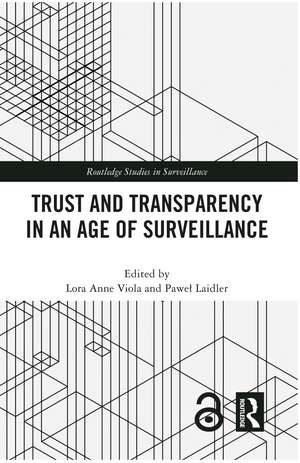Trust and Transparency in an Age of Surveillance: Routledge Studies in Surveillance
Editat de Lora Anne Viola, Paweł Laidleren Limba Engleză Paperback – 31 mai 2023
Dominant in both the scholarly literature and public debate is the conviction that transparency can promote better-informed decisions, provide greater oversight, and restore trust damaged by the secrecy of surveillance. The contributions to this volume challenge this conventional wisdom by considering how relations of trust and policies of transparency are modulated by underlying power asymmetries, sociohistorical legacies, economic structures, and institutional constraints. They study trust and transparency as embedded in specific sociopolitical contexts to show how, under certain conditions, transparency can become a tool of social control that erodes trust, while mistrust—rather than trust—can sometimes offer the most promising approach to safeguarding rights and freedom in an age of surveillance.
The first book addressing the interrelationship of trust, transparency, and surveillance practices, this volume will be of interest to scholars and students of surveillance studies as well as appeal to an interdisciplinary audience given the contributions from political science, sociology, philosophy, law, and civil society. The Open Access version of this book, available at www.taylorfrancis.com, has been made available under a Creative Commons Attribution-Non Commercial-No Derivatives 4.0 license.
| Toate formatele și edițiile | Preț | Express |
|---|---|---|
| Paperback (1) | 389.66 lei 43-57 zile | |
| Taylor & Francis – 31 mai 2023 | 389.66 lei 43-57 zile | |
| Hardback (1) | 1004.55 lei 43-57 zile | |
| Taylor & Francis – 12 noi 2021 | 1004.55 lei 43-57 zile |
Preț: 389.66 lei
Nou
Puncte Express: 584
Preț estimativ în valută:
74.56€ • 78.05$ • 62.06£
74.56€ • 78.05$ • 62.06£
Carte tipărită la comandă
Livrare economică 31 martie-14 aprilie
Preluare comenzi: 021 569.72.76
Specificații
ISBN-13: 9780367638177
ISBN-10: 0367638177
Pagini: 276
Ilustrații: 1 Tables, black and white
Dimensiuni: 156 x 234 x 15 mm
Greutate: 0.45 kg
Ediția:1
Editura: Taylor & Francis
Colecția Routledge
Seria Routledge Studies in Surveillance
Locul publicării:Oxford, United Kingdom
ISBN-10: 0367638177
Pagini: 276
Ilustrații: 1 Tables, black and white
Dimensiuni: 156 x 234 x 15 mm
Greutate: 0.45 kg
Ediția:1
Editura: Taylor & Francis
Colecția Routledge
Seria Routledge Studies in Surveillance
Locul publicării:Oxford, United Kingdom
Public țintă
General, Postgraduate, and Undergraduate AdvancedNotă biografică
Paweł Laidler, Ph.D. is Professor of Political Science at the Institute of American Studies and Polish Diaspora at the Jagiellonian University in Krakow.
Lora Anne Viola, Ph.D. is Professor of Political Science and Chair of the Politics Department at the John F. Kennedy Institute for North American Studies, Freie Universität Berlin.
Lora Anne Viola, Ph.D. is Professor of Political Science and Chair of the Politics Department at the John F. Kennedy Institute for North American Studies, Freie Universität Berlin.
Cuprins
Introduction
1. On the Relationship Between Trust, Transparency, and Surveillance
Part I: Rethinking Transparency’s Relationship to Power and Domination
2. The Limits of Transparency as a Tool for Regulating Surveillance: A Comparative Study of the United States, United Kingdom, and Germany
3. A Neo-Republican Critique of Transparency: The Chilling Effects of Publicizing Power
4. The Dynamics of Imposed Transparency and its Role in Deep Social Conflicts
5. Classifying and Dividing Labor: The Political Economy of Racializing Surveillance
Part II: Transparency and Trust as Institutional Constraints and Critical Praxis
6. Secrecy Versus Transparency in the US National Security Surveillance State
7. Secret Surveillance in Poland After Snowden: Between Secrecy and Transparency
8. Legal Safeguards and Oversight Innovations for Bulk Surveillance: An International Comparative Analysis
9. Transparency and Surveillance of End Users on Social Media Platforms: A View of Structural Economic Factors
Part III: Sources of Trust and Virtues of Mistrust in an Age of Surveillance
10. Trust and Surveillance: An Odd Couple or a Perfect Pair?
11. Trustworthy Humans and Machines: Vulnerable Trustors and the Need for Trustee Competence, Integrity, and Benevolence in Digital Systems
12. Why a Militantly Democratic Lack of Trust in State Surveillance can Enable Better and More Democratic Security
Outlook
13. Surveillance, Transparency, and Trust: Critical Challenges from the COVID-19 Pandemic
1. On the Relationship Between Trust, Transparency, and Surveillance
Part I: Rethinking Transparency’s Relationship to Power and Domination
2. The Limits of Transparency as a Tool for Regulating Surveillance: A Comparative Study of the United States, United Kingdom, and Germany
3. A Neo-Republican Critique of Transparency: The Chilling Effects of Publicizing Power
4. The Dynamics of Imposed Transparency and its Role in Deep Social Conflicts
5. Classifying and Dividing Labor: The Political Economy of Racializing Surveillance
Part II: Transparency and Trust as Institutional Constraints and Critical Praxis
6. Secrecy Versus Transparency in the US National Security Surveillance State
7. Secret Surveillance in Poland After Snowden: Between Secrecy and Transparency
8. Legal Safeguards and Oversight Innovations for Bulk Surveillance: An International Comparative Analysis
9. Transparency and Surveillance of End Users on Social Media Platforms: A View of Structural Economic Factors
Part III: Sources of Trust and Virtues of Mistrust in an Age of Surveillance
10. Trust and Surveillance: An Odd Couple or a Perfect Pair?
11. Trustworthy Humans and Machines: Vulnerable Trustors and the Need for Trustee Competence, Integrity, and Benevolence in Digital Systems
12. Why a Militantly Democratic Lack of Trust in State Surveillance can Enable Better and More Democratic Security
Outlook
13. Surveillance, Transparency, and Trust: Critical Challenges from the COVID-19 Pandemic
Descriere
Investigating the theoretical and empirical relationships between transparency and trust in the context of surveillance, this volume argues that neither transparency nor trust provides a simple and self-evident path for mitigating the negative political and social consequences of state surveillance practices.










